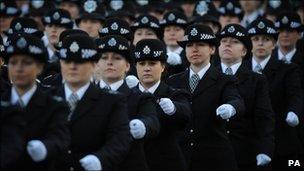How well are police officers paid?
- Published

A review of police pay and conditions in England and Wales says more than 40% of officers should have their basic salary cut. But how do police salaries compare to nurses, teachers and other public sector workers?
Up to 40% of police officers could lose up to £4,000 a year if the Winsor Review, external is implemented.
The report says officers on front-line duties could see their basic pay rise but overtime payments and special allowances would be restricted.
The review, which identified £485m of savings over three years, says police earn 10 to 15% more than other emergency workers and the armed forces, and in some areas they are paid up to 60% more than average local earnings.
But the chairman of the Police Federation, Paul McKeever, said the cuts could mean many officers losing their homes.
So how does police pay compare with that of nurses, teachers, fire officers and soldiers?
The basic salary for a typical officer at entry level is nearly £2,000 more than nurses, teachers and firefighters, and considerably better than armed forces personnel.
Comparisons with nurses and teachers are complicated by differences in benefits, says Charles Cotton, who analyses pay and rewards for the Chartered Institute of Personnel and Development.
"But you'd have to say that, put next to equivalent emergency personnel such as fire services, the police do seem to be well paid, and even next to the armed forces they do well."
Trying to put objective values on public sector jobs is fraught with difficulty, says Tony Travers of the London School of Economics, because the pay settlements of doctors and nurses are based, not on any objective assessment of the worth, but on politics.
The Winsor Review of police pay is no different. And at a time when the rest of the public sector is being squeezed, it is natural that police find themselves in the nutcracker, says Travers.
"It's implausible for police to say that they uniquely should be protected," he says.
But the trouble with the Winsor Review, says Travers, is that the government has taken a new issue - austerity - and used it as an excuse to settle an old score - the thorny issue of overtime and allowances.
"These are really two separate issues," he says. "The huge overtime bill has been a long-running battle. Successive home secretaries have tried and failed to address it."
But while newspapers are full of juicy tales of individual officers earning a fortune in overtime, it would be foolish to think that police have a meal ticket, says Prof Roger Seifert, of City University, a labour economist who has worked closely with the Police Federation.
He argues that overall, considering the conditions police work under, their take-home pay is appropriate.
"You have to look at what is expected of police officers. They are always on duty - they can be called out at any time. You can't call a teacher at 3am and say 'come to work now.'"
Firefighters and police earn roughly equal amounts after five years of service - about £28,000 and £31,000 respectively, he says.
Soldiers' salaries are smaller, despite the risks, but they get very high levels of subsidy, says Seifert, such as accommodation, food and housing.
And part of the reason nurses earn less is due to the historic pay gap between male and female-dominated professions. But they can work as agency nurses to top up their pay.
Police officers may receive a housing allowance, take early retirement, and a pension package which is better than most public sector workers, he says. But over the lifetime of a career, it evens out.
"Remember that the career progression for a police officer is limited. People get stuck at sergeant and that pegs back their earnings," Seifert says.
And while he accepts that the system of allowances should be streamlined, any bid to reduce overall pay would be dangerous, because low police pay can lead to corruption and incompetence.
"Take for example the US, where police pay varies from state to state. Southern states like Missouri pay very badly and they get a terrible police service."
And improving economy and efficiency would not necessarily make the police force more effective, says Mr Cotton. "Just because you've reduced the bill doesn't mean you'll get value for money," Seifert says.
While reviews like Winsor's focus on the rewards, he believes there is a broader question: What do we want from the service and what skills do we need?
"When you come to pay don't just look at the broad figures. Ask what you want from the service and proceed from there," he says.
"For example, why do we need so many police authorities?"
Additional reporting by Neil Henderson